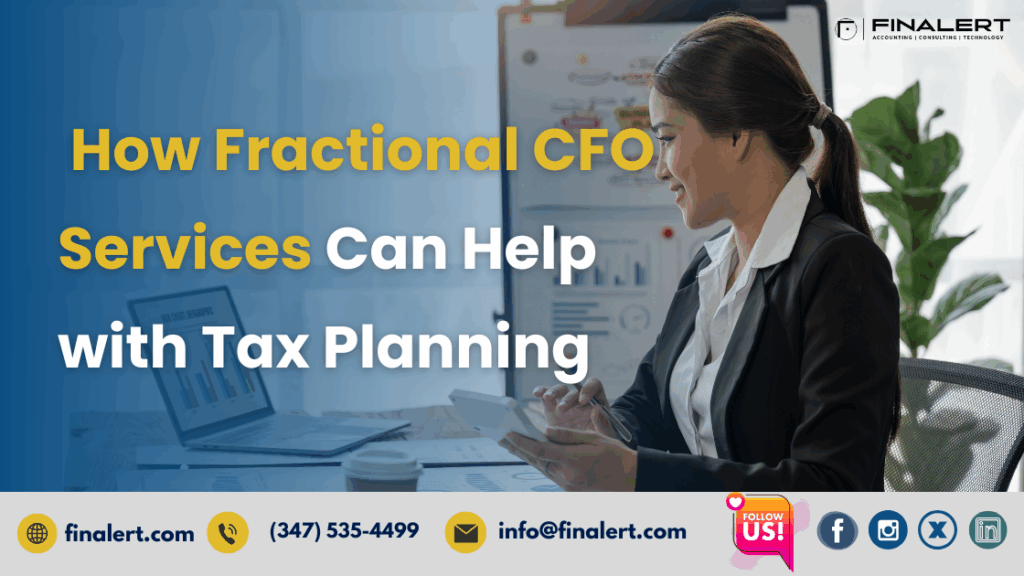
For small and mid-sized businesses (SMBs), navigating the complexities of tax planning can be overwhelming. Balancing day-to-day operations while trying to optimize taxes often leaves business owners reactive instead of strategic. That’s where Fractional CFO services come in.
A Fractional CFO (Chief Financial Officer) provides high-level financial expertise on a part-time or project basis. These professionals offer the same insights and capabilities as a full-time CFO, without the cost of a permanent executive hire. One of their most impactful contributions is proactive tax planning.
This article explores how fractional CFOs support tax optimization, compliance, and strategic financial management. Whether you’re scaling a startup, managing multiple revenue streams, or preparing for an exit, partnering with a fractional CFO can transform how your business approaches taxes.
Before diving into tax-specific benefits, it’s important to clarify what a fractional CFO does.
Unlike bookkeepers or accountants, a fractional CFO provides forward-looking financial leadership focused on long-term value creation.
Many business owners mistake tax preparation for tax planning. The former involves filing returns; the latter focuses on structuring finances to reduce tax liability over time.
A fractional CFO works throughout the year—not just at tax time—to align business strategy with optimal tax outcomes.
The structure of your business—LLC, S Corp, C Corp, Partnership—has a direct impact on how income is taxed.
Rather than being surprised by a large tax bill in April, fractional CFOs monitor liabilities in real-time.
Federal and state governments offer a range of tax credits, but many go unused because businesses aren’t aware of or properly documenting their activity.
A fractional CFO will:
Owner and executive compensation can significantly influence both business and personal tax outcomes.
Fractional CFOs assist with:
When a business acquires equipment, vehicles, or property, the timing and classification affect tax treatment.
Fractional CFOs help:
In high-growth businesses, ownership changes can trigger significant tax consequences.
A fractional CFO provides:

Fractional CFOs don’t replace your CPA—they enhance collaboration.
Together, they create a full-picture approach to compliance and optimization.
You get a C-suite-level strategy without the full-time salary—ideal for SMBs managing tight budgets or transition phases.
Proactive planning reduces tax surprises, improves quarterly budgeting, and ensures you retain more capital to reinvest.
When tax planning is integrated year-round, compliance is cleaner and better documented, minimizing the risk of IRS scrutiny.
Fractional CFOs offer insights that go beyond compliance, helping you time hires, purchases, investments, and expansion for tax-smart growth.
Taxes are one of the largest controllable expenses for any business. Yet most SMBs treat tax planning as a seasonal activity, reacting to deadlines instead of leveraging strategy. A fractional CFO changes that.
By embedding strategic tax planning into your broader financial operations, a fractional CFO helps your business stay compliant, nimble, and optimized for growth. From choosing the right entity to forecasting tax liabilities and capturing overlooked credits, their role is transformative not just for taxes but for long-term business value.
At Finalert, we specialize in providing fractional CFO services tailored to the unique challenges and opportunities faced by U.S. businesses. If your business is seeking year-round tax clarity, more efficient financial systems, and more strategic decision-making, a fractional CFO may be the next logical step forward.
Similar Articles
No results available
Get in touch with Finalert today for tailored business solutions!
No results available
Ready to thrive? Connect with Finalert today and let’s succeed together in the dynamic global market.
© 2025 Finalert. All rights reserved.
Ready to grow with confidence and clarity?
Finalert delivers high-quality accounting, financial advisory, and analytics services tailored to growing businesses providing control, visibility, and decision-ready insight to support sustainable success.
Address
Our Services
Accounting Services
Advisory Services
Industries
Quick Links
© 2026 Finalert® LLC. All Rights Reserved.